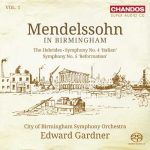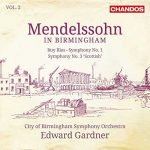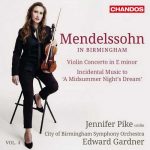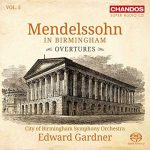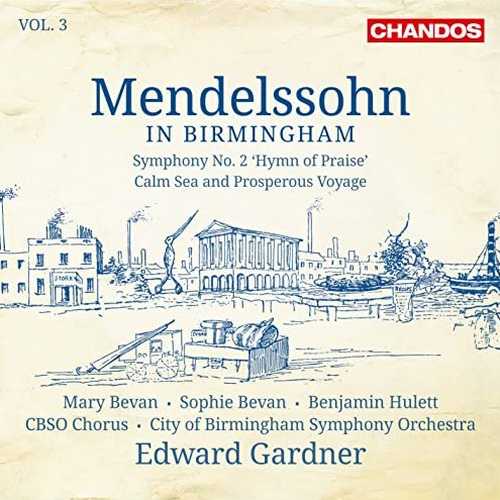
Composer: Felix Mendelssohn
Performer: Sophie Bevan, Benjamin Hulett, Mary Bevan, City of Birmingham Symphony Orchestra Chorus
Orchestra: City of Birmingham Symphony Orchestra
Conductor: Edward Gardner
Format: FLAC (tracks)
Label: Chandos
Release: 2016
Size: 1.24 GB
Recovery: +3%
Scan: yes
Calm Sea and Prosperous Voyage, Op. 27
01. Meeresstille (Calm Sea)
02. Gluckliche Fahrt (Prosperous Voyage)
Symphony No. 2 in B flat major, Op. 52 ‘Lobgesang’
03. I. Sinfonia: Maestoso con moto – Allegro – Maestoso con moto come I
04. I. Allegretto un poco agitato
05. I. Adagio religioso
06. II. All men, all things, all that has life and breath
07. II. Praise thou the Lord, O my spirit
08. III. Recitative: Sing ye praise, all ye redeemed of the Lord
09. III. He counteth all your sorrows in the time of need
10. IV. All ye that cried unto the Lord in distress and deep affliction
11. V. I waited for the Lord, He inclined unto me
12. VI. The sorrows of death had closed all around me
13. VI. We called thro’ the dardness – The night is departing!
14. VII. The night is departing
15. VIII. Chorale: Let all men praise the Lord
16. VIII. Chorale: Glory and praise to God
17. IX. My song shall be alway Thy mercy
18. X. Ye nations, offer to the Lord glory and might!
19. X. O give thanks to the Lord
Recorded: 15-16 February 2014
Recording Venue: Town Hall, Birmingham, United Kingdom
This is the third recording in our Mendelssohn in Birmingham series, with the City of Birmingham Symphony Orchestra and its Principal Guest Conductor, Edward Gardner. The album features Calm Sea and Prosperous Voyage (Meeresstille und glückliche Fahrt) and Symphony No. 2, completing our survey of Mendelssohn’s mature symphonies.
Calm Sea and Prosperous Voyage is the second in a trilogy of concert overtures by Mendelssohn, the two others being A Midsummer Night’s Dream and The Hebrides, the latter recorded on Vol. 1 in this Chandos series. Based on two poems by Goethe these sonorous images describe a ship helplessly becalmed in the open sea, then carried by rising winds towards land. The densely textured, immensely slow opening evocation of oceanic calm and the following quickening full orchestral crescendo strikingly depict Goethe’s verses. Symphony No. 2 was valued as one of Mendelssohn’s greatest and most influential achievement for much of the nineteenth century – not least in Britain – but it has since come to be viewed equivocally. A fusion of neo-baroque procedures with romantic sentiment provides the backdrop of this hybrid Symphony-Cantata, made up of three orchestral movements and a choral finale, in which smooth contrapuntal arias contrast with exuberant, dramatic choral sections. The soloists are all emerging young artists in Britain, the wonderfully talented soprano sisters Mary and Sophie Bevan and the tenor Benjamin Hulett.
